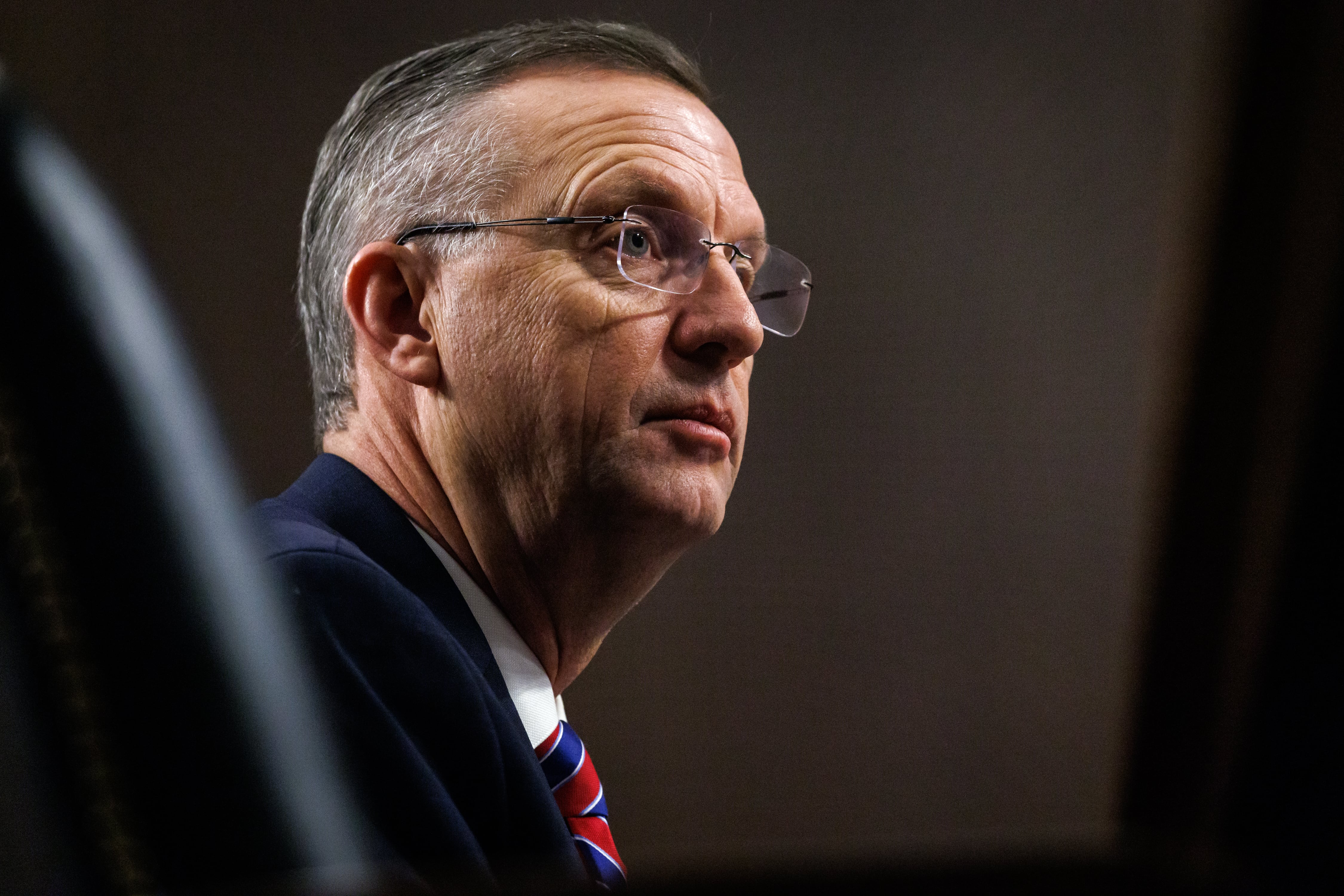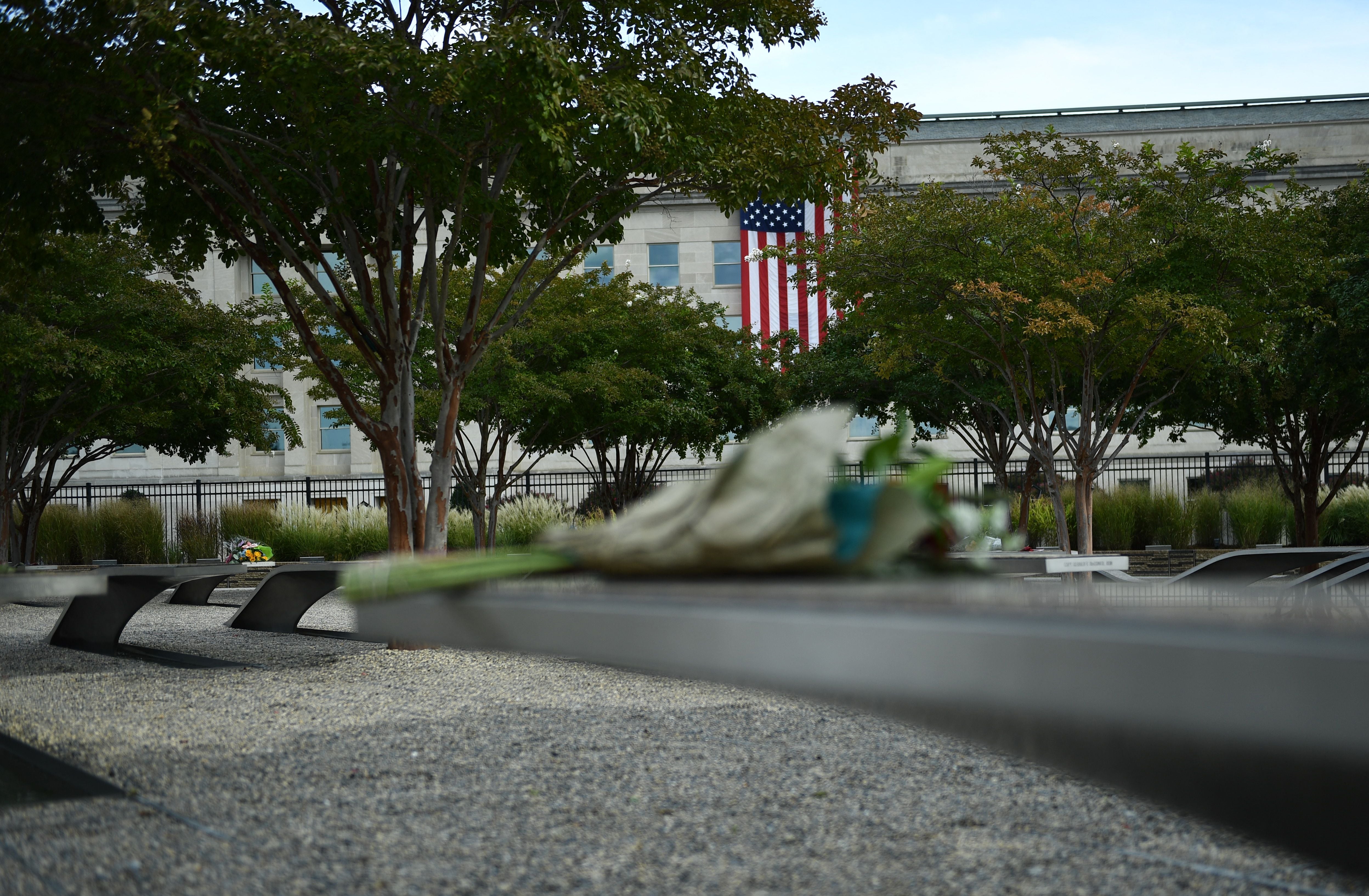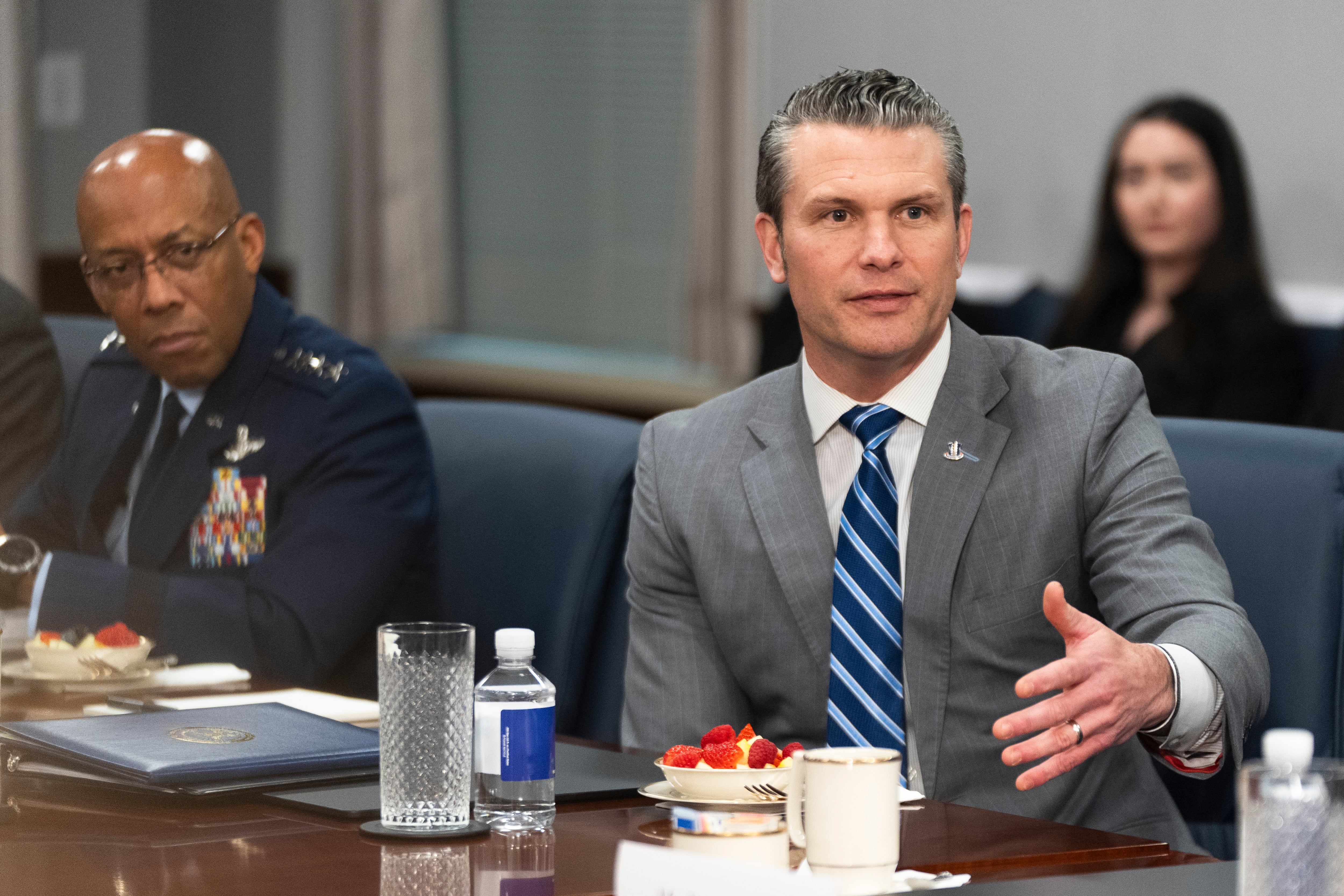BLACKSBURG, Va. — Sima Gul hiked the steep terrain of the Hindu Kush in Afghanistan, gripping an M4 carbine. Her platoon moved silently and swiftly across the barren landscape, cloaked by the dark of night and navigating the mountainous terrain through the green glow of night vision goggles.
Even in the below-freezing temperature, Gul felt sweat trickle inside her body armor. Hours passed as she trudged alongside the U.S. military tracking down the Taliban in her homeland. It was but one episode in Gul’s six years as a member of the Afghan Female Tactical Platoon, a partner to U.S. Special Operations forces that served as a covert unit on combat missions against the Taliban.
RELATED
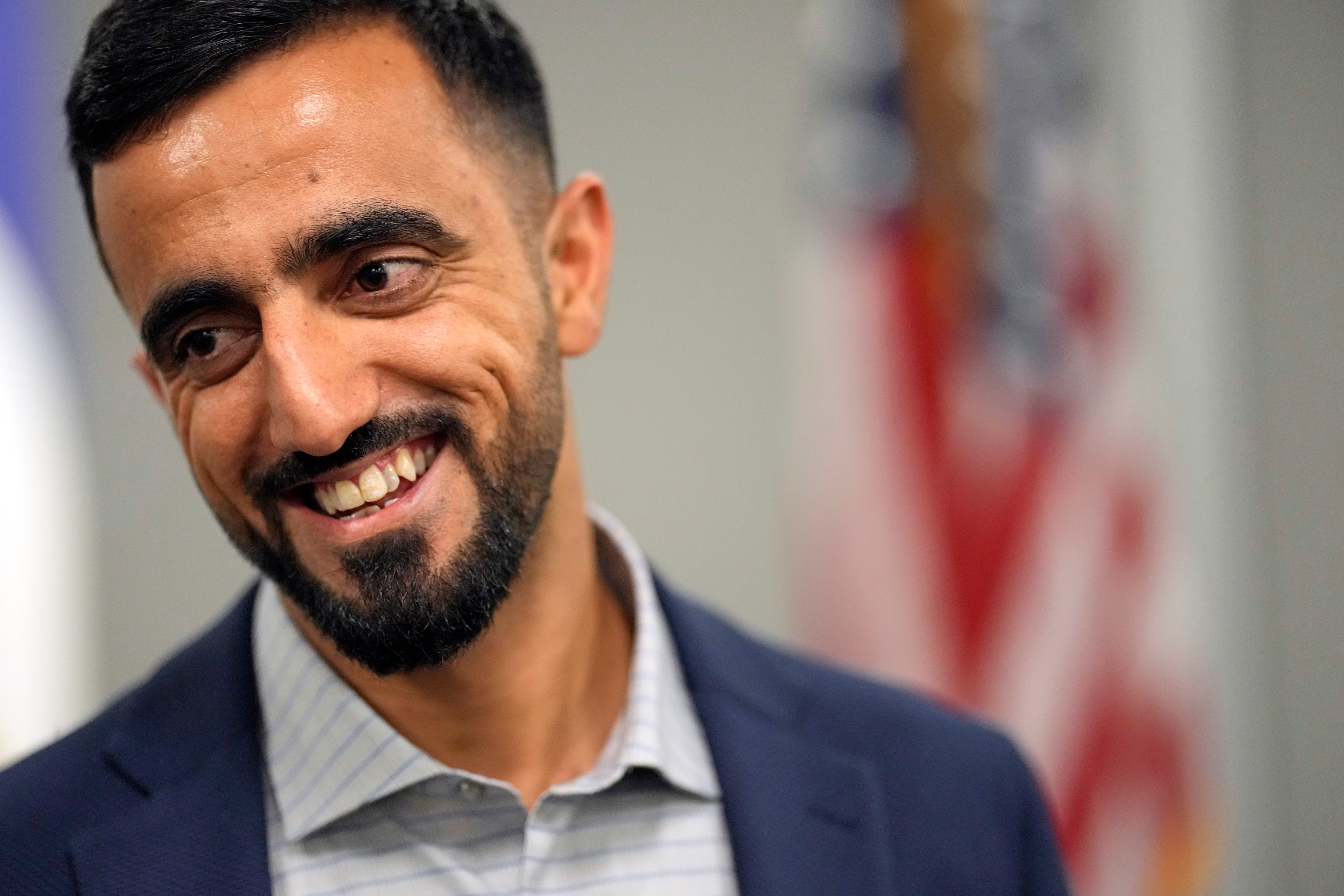
Two years later, in the middle of the night in a Blacksburg apartment on the other side of the world, Gul clutched a smartphone instead of a rifle, staying awake late at night talking on the phone to family that remains in Afghanistan. She worries about their safety and about her mother, who lost the use of her legs in an explosion at an airport after the Taliban regained control of the country in August 2021.
“They don’t know any minute if they are going to be alive or the Taliban is going to attack their house and grab everything and kill them or not,” Gul said of her family, speaking in her native Dari language through a translator.
Memories of loved ones who died in war haunt her as she tries to make a new life for herself and her 2-year-old son, Amir. Gul settled in Blacksburg alongside other Afghan women soldiers who fought alongside Americans, but whose fates in the United States are unclear.
Gul, 26, said she dreamed of studying art and becoming an actress before she decided to join the Afghan military.
“This is breaking all the taboos,” Gul said about women’s military service in her country. “It doesn’t matter how they think; it was my goal to join and I did it.”
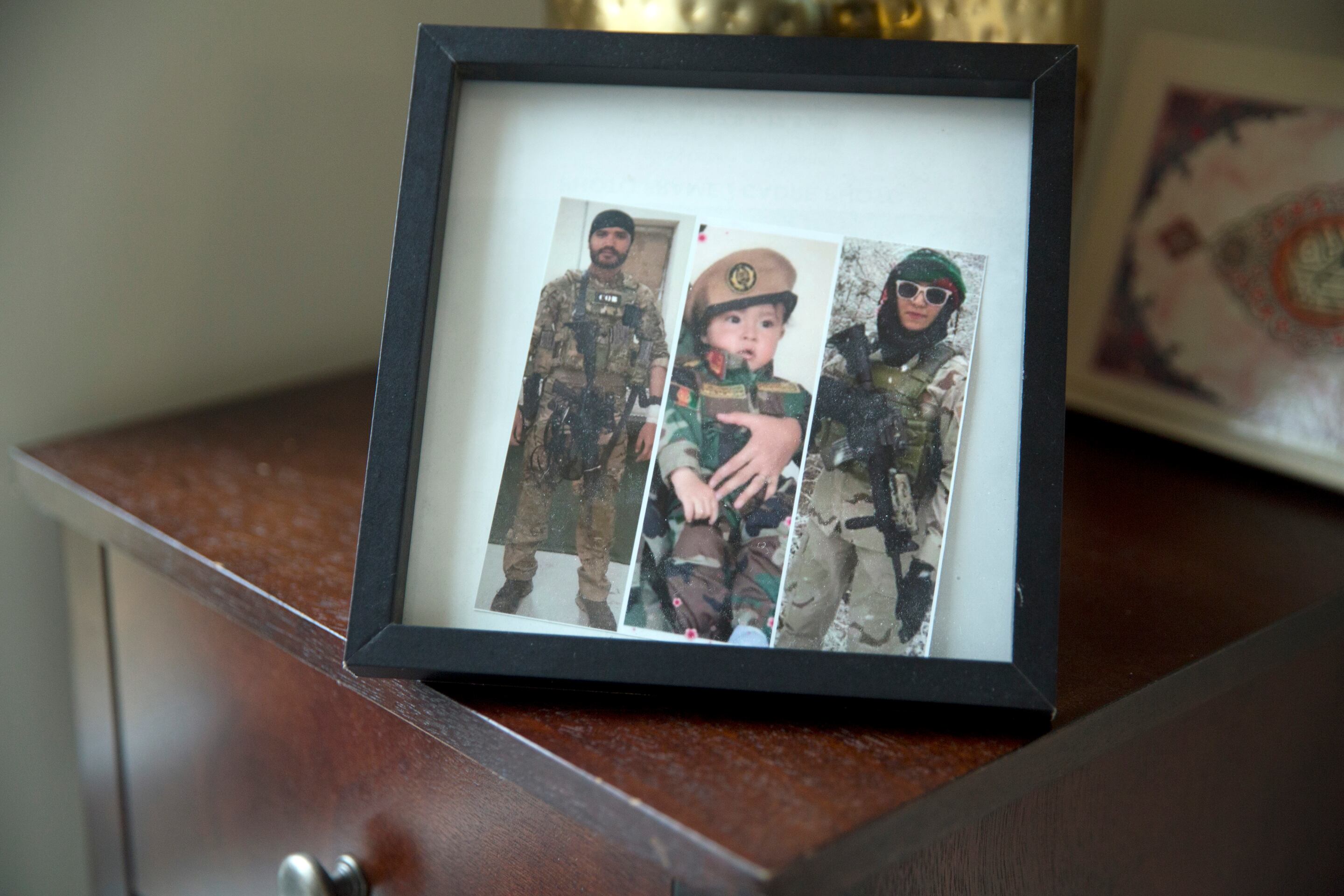
Female Tactical Platoon members were an advantage for the U.S. Special Forces against the Taliban because of their gender. Female platoon members escorted women and children to safety where they were searched and questioned.
“Men cannot search the body of a woman in Afghan culture,” Gul said. “We could communicate with Taliban’s women to get more information, asking a lot of questions and also searching them to see if there are any weapons or explosive devices.”
Gul served in the thick of combat.
“The only mission that I will never forget was the time that there was an explosion, I was so scared and freaked out,” Gul said of the blast that killed five male Afghan soldiers. “All of their body parts were shattered. They had missing limbs.”
Gul met her husband while serving with the Afghan military. He died in a separate explosion in 2020, during a raid on the Taliban. He had recently returned to active duty following the couple’s honeymoon. Gul had told him that she was pregnant, shortly before he died in the explosion.
“Amir is the only precious thing I have from my husband,” she said, tears running down her cheeks.
More than 40 FTP fighters were relocated to the United States after the Taliban takeover, with the highest number of former FTP members in Blacksburg, said Rebekah Edmondson, program manager of the Afghan Rescue and Resettlement Program sponsored by the PenFed Foundation, which provides support and assistance to former members of the Female Tactical Platoon.
Seeking asylum
Gul and her colleagues are among more than 70,000 Afghans who were evacuated from their homeland and came to the U.S. on humanitarian parole after the U.S. military left Afghanistan. The parole was authorized for two years under President Joe Biden and will expire in August.
Gul and other FTP members are waiting to hear back about their asylum applications. Another glimmer of hope is for Congress to pass the Afghan Adjustment Act, which could give them permanent status in the United States. So far, however, Congress has not passed the bill, which has been in House and Senate committees since last year. Gul worries that she and other FTP fighters could be returned to Afghanistan if Congress does not act.
Edmondson worked with Gul in Kabul as part of the U.S. Army’s Cultural Support Team that trained the Female Tactical Platoon.
“Sima always brought positivity to an otherwise really challenging environment,” Edmondson said. “There was a lot of very difficult challenges and barriers to overcome, and irrespective of that, she’d show up with a smile on her face and she also brought this certain kind of flair.”
Edmondson said she is concerned about members of the Female Tactical Platoon who are still in Afghanistan, who could be in danger of Taliban reprisals against them or their families. She explains that not only military equipment was left behind, but also computer data systems have been compromised that could identify Afghans who worked with the U.S. government.
More than 8,000 Special Immigrant Visas were granted to Afghans who aided the U.S. government, according to the Department of State and Department of Homeland Security. SIVs grant people who aided the U.S. government permanent residence.
The Afghan Adjustment Act, which has received bipartisan support in Congress, would expand eligibility for SIVs to certain Afghan nationals and provides a pathway to permanent residence for at-risk Afghan allies and relatives, after additional vetting. The act was stripped from an omnibus spending bill in December, dousing hopes of thousands of refugees and angering supporters.
RELATED
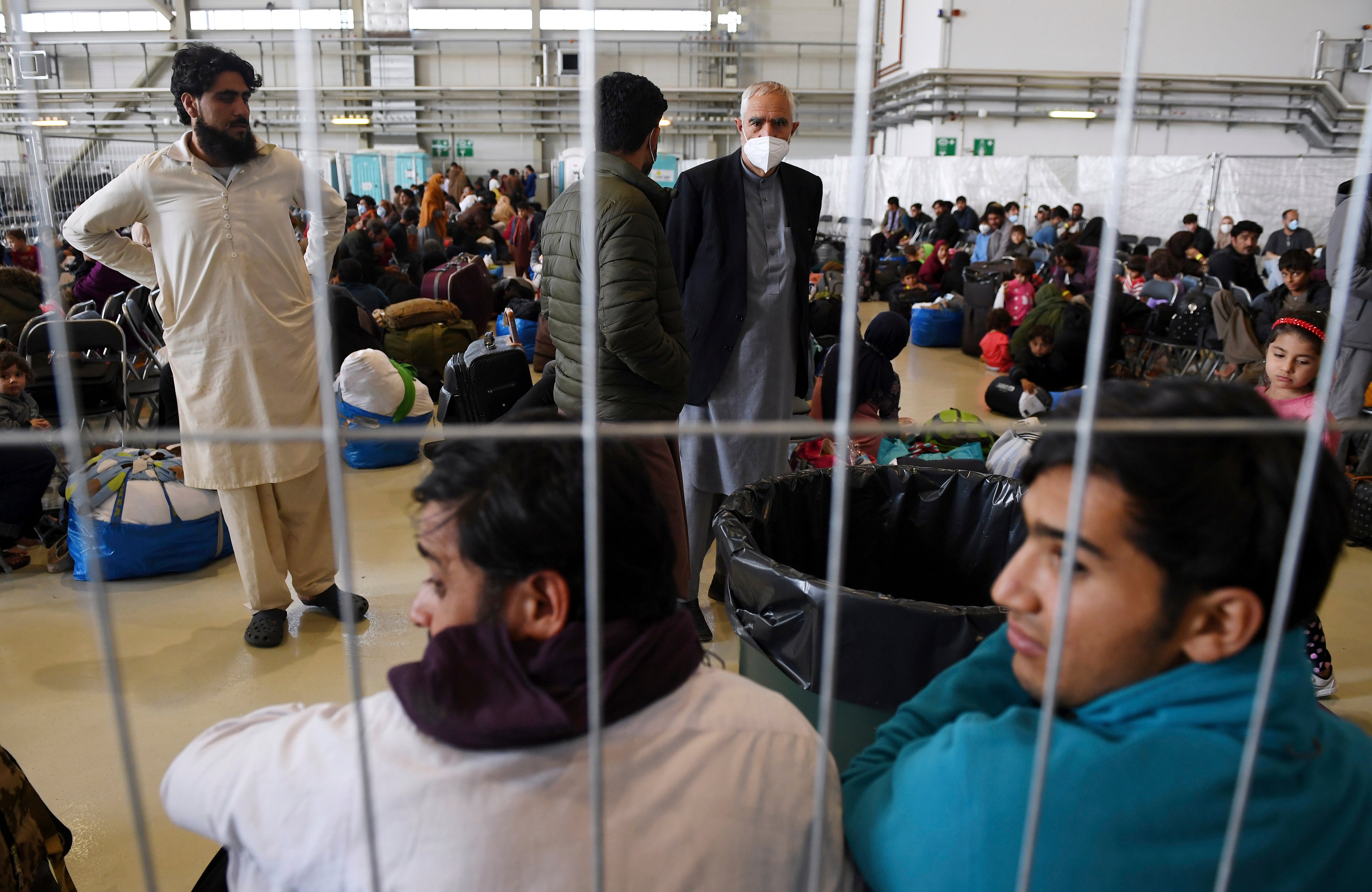
The bill has languished in both the House and Senate judiciary committees since last year. It is unclear if Congress will get a chance to vote on the bill.
U.S. Sen. Tim Kaine, D-Va., who is not on the Senate Judiciary Committee, said he supports the Afghan Adjustment Act.
“Our Afghan allies were critical to supporting U.S. personnel,” Kaine said in an email. “I was proud that Virginia played such a vital role during the 2021 evacuation mission, but we must continue to do more to help them and their families, including by passing the Afghan Adjustment Act.”
Chances to learn
The Blacksburg Refugee Partnership and The Secular Society helped bring together the Afghan military women, all of whom served together there. They are making new homes for themselves in an apartment complex wedged against the woods in the college town. (The Secular Society is a Blacksburg-based nonprofit that has assisted other refugees and has funded a fellowship that has supported this reporting.)
Gul arrived at the Roanoke-Blacksburg Regional Airport on a rainy December evening, greeted by a terminal filled with smiling faces. Friends from the Afghan military, volunteers with Blacksburg Refugee Partnership and mentors from the Cultural Support Team, including Edmondson, welcomed Gul and Amir to their new home in Blacksburg with a bouquet of balloons, some which read, “It’s your day!”
Gul pushed her sleeping son in his stroller. Fellow Female Tactical Platoon member Azizgul Ahmadi was one of the first to embrace her.
Gul and Ahmadi served together in Afghanistan and have been living in Blacksburg along with fellow Female Tactical Platoon members and family members, all of whom fled their home country after the Taliban takeover. One woman came to Blacksburg with her husband and their daughter. Ahmadi came with her teenage sister.
Gul initially relocated to Salt Lake City, Utah, with the aid of U.S. immigration officials, before moving to Blacksburg with help from PenFed Foundation, Blacksburg Refugee Partnership and Sisters of Service. The latter group is comprised of American women veterans who served in Afghanistan with the Cultural Support Teams that trained FTP fighters, and who now work to resettle Afghan women who fought with them. Gul’s mentor through Sisters of Service, Becca Moss, greeted her in Roanoke at the airport.
Gul said she moved to Blacksburg to be with her peers from the Afghan military, and because of the partnership’s support.
In Utah, Gul said she had a full-time job, her driving permit and child care for Amir, but she had little time to learn English and struggled to find people to teach her the new language. Blacksburg offered an opportunity to not only live among friends but to focus on learning English.
“I want to learn English so I can stand on my own two feet,” Gul said, using some of the English she has been learning.
In Utah, Gul also did not have access to the dedicated volunteers she now has through Blacksburg Refugee Partnership, which teaches her English four days a week. In Blacksburg, The Secular Society provides Gul with funds that will allow her to study English at Virginia Tech’s Language and Cultural Institute when she is ready for the advanced program, and to work toward her academic goals.
Edmondson explained that the amount of support offered by Blacksburg Refugee Partnership is unmatched.
“Blacksburg is a unique community in that you’ve got so many volunteers who dedicate so much of their time and their energy and attention to helping these people,” Edmondson said. “The support that the families receive from Blacksburg Refugee Partnership is just exponentially more impactful.”
The Secular Society provides BRP financial support for the Afghan women, helping them gain their independence in the United States. The Secular Society pays for all living and educational expenses for the Afghan military members as they work toward their educational goals and study English. The women, including Gul and Ahmadi, are referred to as TSS Scholars.
Fighting for a better life
Ahmadi did not know how to speak English when she arrived in the United States with her teenage sister a little more than a year ago.
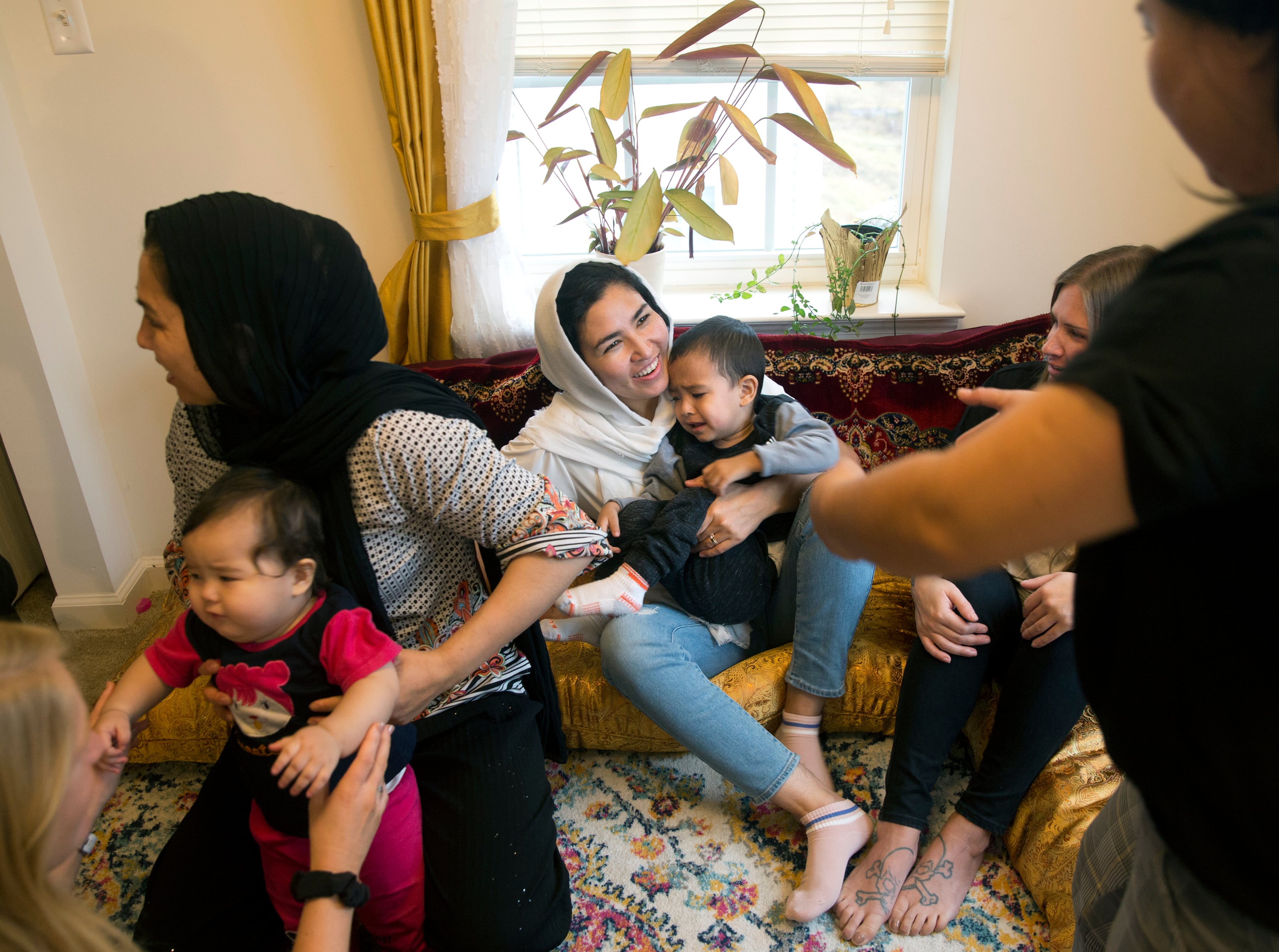
“I did not know my ABCs,” she said, her English now vastly improved.
She feels a sense of responsibility to help Afghan women who continue to suffer under Taliban rule.
“I am very sad about the Afghan women, because I am here and I am safe and I have a good life right now, but I think about the women in Afghanistan who have to stay home and not go to work or school.”
In Afghanistan, Ahmadi, 28, was a police officer before joining the Female Tactical Platoon. She studied science and law for four years at Kabul University and was working toward her master’s degree in criminology when the Taliban took over.
She wanted to fight the Taliban because she hoped for a better life for Afghan women. The American action films that she watched while growing up influenced her.
“As a kid I always watched American movies, like Arnold (Schwarzenegger) and Rambo. I always want to be strong and fight the bad people.”
Happy memories scarce
Gul and Ahmadi walked to class, their backpacks filled with English learning books, and entered a mobile home owned by Blacksburg United Methodist Church.
The English class, which focuses on communication for daily life, is taught four days a week through Literacy Volunteers of the New River Valley, in partnership with Blacksburg Refugee Partnership.
“This class is a skill-up class,” said class instructor Anne Abbott, a board member with the refugee partnership, explaining that the students focus on English to achieve real-life goals.
The Afghan military women have a variety of English learning options, Abbott explained, including scholarships through The Secular Society to attend classes at the Language and Culture Institute at Virginia Tech, a program that is part of the university’s outreach to international students. Abbott said that the English classes are rigorous and can be more challenging, because they focus on language that is beneficial for academia. It can also be a challenge for working mothers to meet the class demands .
During Abbott’s English class, four women sat around a table in a room plastered with posters of brightly colored letters and numbers, along with maps of the world and the United States.
Abbott asked the women to break into groups with individual tutors and share stories about happy memories.
Ahmadi, however, could not think of happy memories.
“I was forced to marry when I was 12,” she said, recalling how she had to stay home and cook and clean for her husband. Her family was able to help her divorce her husband, and she got a job to help financially support her family.
Ahmadi also recalled when she was 8, before the U.S. occupation, when her dad was kidnapped and tortured by the Taliban. She said her father was returned but has trouble walking because the Taliban whipped the soles of his feet, leaving permanent injuries.
Ahmadi started to cry. Soon, so did the other Afghan women in the room.
Gul talked about her son, but then shared about the tragic death of her husband.
“Amir brings me happiness,” Gul said. She tried to explain that her husband was dead.
“He is shaheed,” she said, pausing to think of the word Americans would understand. “He is martyr. Nothing is the same.”
Happy memories were scarce, but support from friends was abundant.
After class, Abbott drove Ahmadi to work at a local sub shop, so she could swap an hourlong bus ride for a five-minute commute.
Gul walked to the grocery store, pushing Amir in his stroller through the woods behind her apartment complex. Amir watched the ground, holding his toy truck as his mom struggled over the rocky, rooted path.
Gul spent most of her time in the produce section at the grocery store before venturing down an aisle filled with kids’ drink box options.
“Is this just apple juice?” she wondered aloud, trying to read a list of ingredients on a box.
A changed homeland
Wearing a long pink dress embellished with white sequins, Ahmadi excitedly welcomed guests to her apartment for her sister Shah Pari’s 17th birthday party.
Pari wore a traditional Afghan dress her mother sent from Afghanistan specifically for her birthday.
More than 20 people — Afghan refugees and volunteers from Blacksburg Refugee Partnership — packed the two-bedroom apartment.
A heap of rice next to a circular pattern of cucumber, tomato and radish on a platter were part of an elaborate food display. Pink balloons were twisted into the shapes that spelled “#HBD” —shorthand for “happy birthday.”
Pari beamed as she sat down to a birthday cake topped with two flickering candles, a 1 and a 7. She stared for a moment and covered her face with her hands and began to cry. Gul watched from across the room, tending to Amir, who was crying because he wanted to open the birthday presents. She understood her friend’s tears.
Ahmadi motioned to party guests Abbott and Scott Bailey, president of the Blacksburg Refugee Partnership, to step in. With five individual hands joining to hold the knife, they cut the first slice of cake.
Abbott and Bailey chatted with the Afghan women and their family members. Bailey said how proud he was of an Afghan military member’s brother who got his driver’s license and also of an Afghan woman’s 11-year-son who was student of the week at Gilbert Linkous Elementary School in Blacksburg.
“How did we get so lucky to be here and with such incredible people?” Bailey said to Abbott.
Pari attends Blacksburg High School and takes boxing lessons on the weekends. She hopes to follow her big sister into the military someday.
Traditional, pop-style, Afghan music boomed through the apartment as she and the young military women clapped their hands and danced around the room with their sisters and brothers.
Ahmadi held Amir, swaying back and forth as Gul made her way around the room in a Gucci shirt paired with a floral skirt and black pants. She stretched her arms in all directions and swirled around.
For a short while, Blacksburg seemed like the home they left behind. That home looks much different now, since the Taliban regained control of Afghanistan and women who refuse to be oppressed protest changes made by the Taliban, such as banning girls from schools.
Seeking to serve again
Ahmadi hopes to get her green card so she can join the U.S. military. She applied for asylum and recently had interviews with immigration officials in Washington, D.C., about her status.
She said working with the members of her platoon were some of the best moments of her life and she is thankful and happy to be among fellow military members in Blacksburg.
“Always fear was there. We weren’t so sure that we would get back from each mission,” she said about her past military life. “But on the other hand, I was so happy and proud of myself to do these missions to rescue women who were in danger, or rescue people.”
Ahmadi plans to go to college with The Secular Society’s financial support. Even though she already had an undergraduate degree and was working toward her master’s degree in criminology in Kabul, the process of transferring her degree and credits to the United States was so cumbersome, it was easier just to start college over.
“I am thinking about nursing now,” she said. “Different country, different language, different degree.”
For Gul, the dreams she shared with her husband to raise a family and have a home together linger.
Currently, she is focused on her son and learning English. She cradled Amir, standing in her living room and rocking him in her arms as he fell asleep.
“I would like to send Amir to school,” she said. “I would like to see his progress in the future. I want to see his brilliant future.”
Gul said she prays for her son to be healthy, kind and hard working. She prays for her mother and all people of Afghanistan to be well, and for the Taliban to no longer be in power.
Where her future lies, in the United States or Afghanistan, remains to be seen.


